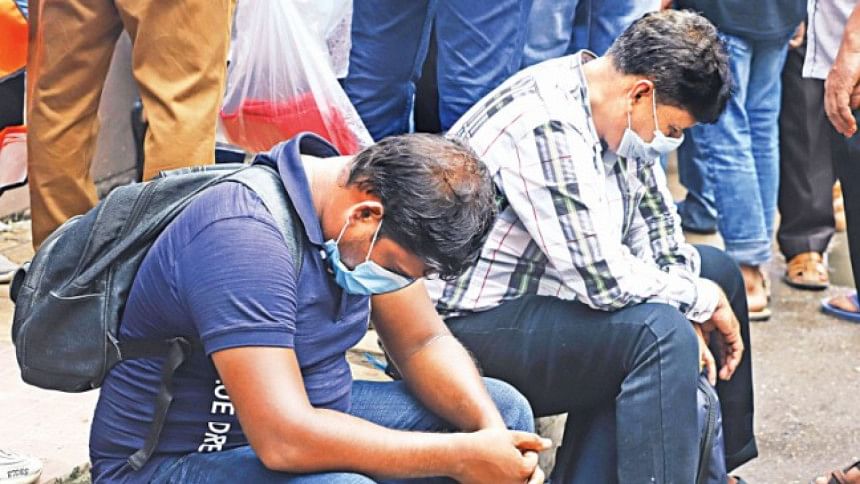Migrant Workers Stuck Home: Drowning in debt

Migrant worker Nazim Uddin returned home from Saudi Arabia in May last year amid the Covid-19 pandemic. His residence permit expired after a few months, meaning he could not return to the Gulf country.
His monthly income in Saudi Arabia had been around Tk 50,000, but he had to send home the lion's share of his earnings as his seven-member family depended on his remittance.
With his meagre savings already exhausted on family expenses, the 42-year-old from Noakhali took a bank loan of Tk 1 lakh and invested the money to set up a small shoe factory in his area. The factory, however, did not do well, forcing him to shut it down.
Nazim also had to borrow around Tk 3 lakh, in phases, from relatives as he hasn't been able to find a job yet. Now, he is worried sick about how to come out of the debt trap.
"I don't know what I should do now," he said.
Like Nazim, many returnees are facing a debt cycle after they borrowed money in the face of economic hardship created by the pandemic. With little or no income, these returnees are in despair, struggling to repay their debts and manage household expenses.
Around 3.76 lakh migrant workers returned home between April 1 and December 17 last year amid the pandemic, according to government data.
International Organisation for Migration (IOM), in its recent survey report, showed the debt burden on the migrant workers and the challenges of reintegration.
The report, titled "Rapid Assessment Round 2: Needs and Vulnerabilities of Internal and International Return Migrants in Bangladesh", found that around 69 percent of 875 returnee migrants from abroad and their households are in debt.
Some 28 percent returnees from abroad have debt higher than Tk 2 lakh and over 50 percent have debt higher than Tk 1 lakh, it said.
The survey on returnees was conducted in 12 high return-migration districts in August and September last year.
The report found 64 percent of the returnees from abroad unemployed.
'OVERWHELMED WITH DEBT'
Since the Covid-19 pandemic hit the world early last year, many Bangladeshi workers returned home in large numbers, either after job losses or seeing no job opportunities in the host countries.
But after coming back to Bangladesh, they often face difficulties in finding employment commensurate with their experience.
The IOM report painted a dismal picture of the increase in the household debt of the returnee migrant workers and negative coping measures that migrant households adopted including reducing expenditure on health and borrowing money to pay back loans.
Sulaiman Mia is one such returnee.
When the 46-year-old from Noakhali's Senbagh was forced to return home from Bahrain in March last year, his employer promised to rehire him once the situation normalised.
A few months after his return, he repeatedly communicated with his employer in Bahrain, but his employer refused every time to renew his work permit citing the economic crisis.
Finding no other alternative, he borrowed around Tk 1.6 lakh from relatives, took a bank loan of Tk 50,000 and another loan of Tk 30,000 from an NGO. He even sold off gold ornaments belonging to his wife and mother to make ends meet.
"I have been unemployed since I came back. Now I am thinking of selling a piece of land to repay the borrowed money. What else can I do, as I am overwhelmed with debt," said a helpless Sulaiman.
He said although he spent nearly 20 years abroad, he could not save enough money since his entire earnings was spent to meet daily family needs and building a new house.
Masud Mollah's condition is similarly bleak.
Hailing from Narsingdi, the 32-year-old returned from Libya in February this year. He said he had borrowed around Tk 80,000 from neighbours and another Tk 60,000 from a local cooperative to pay his migration costs in 2019.
Although he repaid the Tk 80,000 loan, he is yet to repay five out of 11 instalments against the Tk 60,000 loan, he said.
"It's an uncertain future ahead," Masud added.
WHAT CAN BE DONE?
Shariful Hasan, head of Brac Migration Programme, said the pandemic forced a large number of migrant workers to return home within two to three years of their migration.
This group of migrants either borrowed money or sold their properties to pay migration costs, he said, adding at the time of their return, many of them were in debt.
And after returning home, they took fresh loans or borrowed money mostly to meet family expenses, he added.
Shariful said the government needs to create employment opportunities for the unemployed to help them come out of debt.
Many Bangladeshi migrant workers are hired by construction companies in host countries and they develop skills in the sector. So, upon their return, the government can create opportunities for such workers in development projects inside the country, he said.
Similarly, returnees with other skills could be employed in relevant fields inside the country. Besides, there should be effort for those who want to re-migrate, he further said.
Contacted, Nazibul Islam, additional secretary (training) of expatriates' welfare ministry, said the ministry has taken an initiative to provide returnee migrants with recognition of prior learning (RPL) certificates.
On obtaining a RPL certificate, a returnee migrant will be able to get a job in the domestic labour market while it will also help him or her re-migrate, Nazibul told this newspaper over the phone.
The official said initially, their target is to provide RPL certificates to 2,000 returnees, but the number could be extended based on response from the returnees.

 For all latest news, follow The Daily Star's Google News channel.
For all latest news, follow The Daily Star's Google News channel. 



Comments